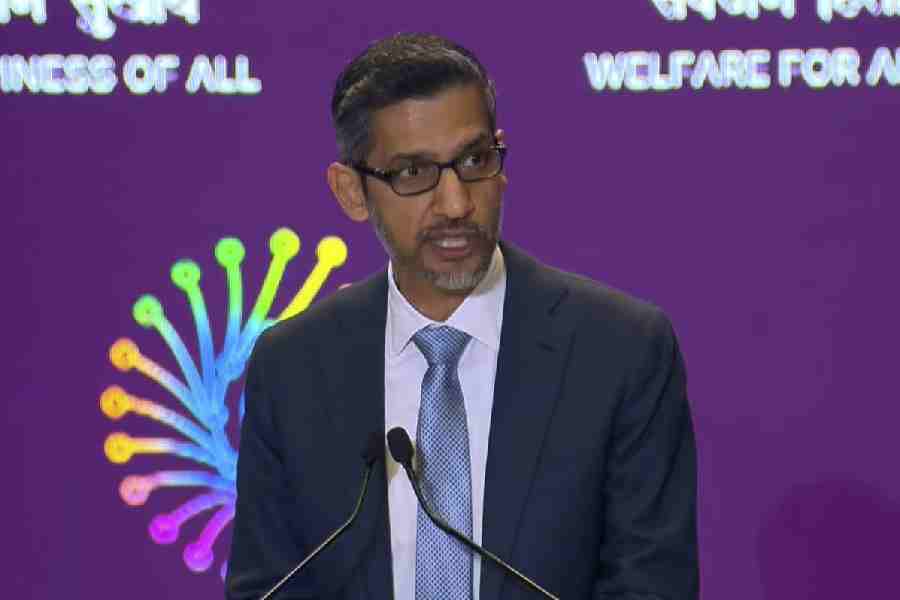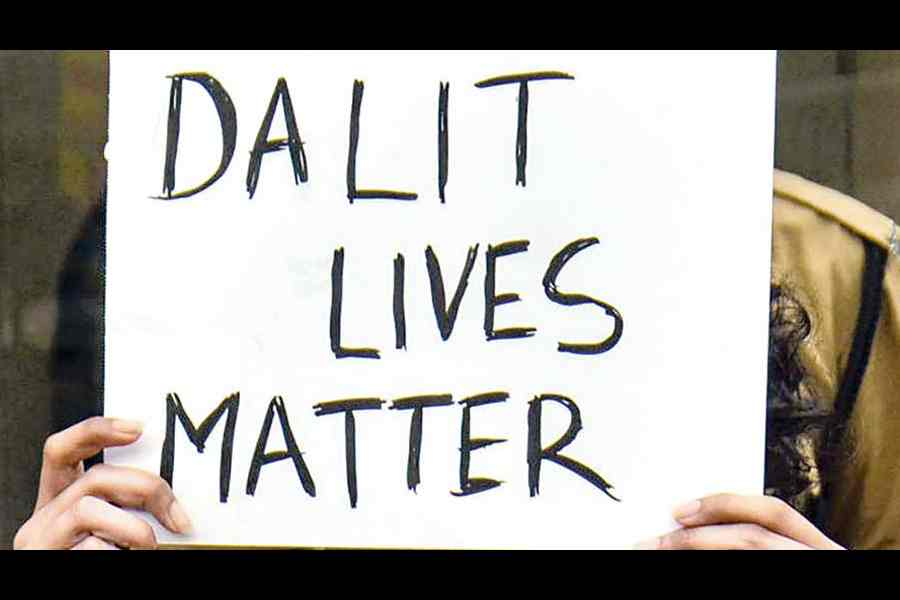

Picture a big babu, and you think of a big buzzer. It buzzes every time the boss wants something done, sending his aides scurrying to his room, notepads in hand.
Krishnaswamy VijayRaghavan doesn't belong to that school. I am waiting for him in his visitors' room, which doubles as his assistants' office, when he emerges from his chambers next door with instructions for his staff officer. He spots me and invites me to his office — though I am there well before the appointed time.
But then, the new secretary of the government's department of biotechnology (DBT) — who writes his name ('just like that') as one word with a capital letter in between — is a scientist.
He totes a backpack. He plays the recorder — 'I am ghastly at it and am forever learning,' he says. He likes his Kindle, where he is reading Daniel Dennett's Intuition Pumps and Other Tools for Thinking. All in all, he is not exactly your regular secretary.
That's not surprising. Before he moved to Delhi to join the DBT earlier this year, he headed one of the finest biology labs in the country. He helped found the National Centre for Biological Sciences (NCBS) with his mentor and guide Obaid Siddiqi in 1992, and headed it for 15 years. The institute, though still a newbie compared to most Indian scientific labs, is known worldwide for its cutting-edge research work.
Does the nature of the new job scare him, I ask him, since this is for the first time that he has taken up a position in Delhi, that too as the head of a research agency with an annual budget of nearly Rs 1,500 crore.
VijayRaghavan removes his trademark Nehru jacket and dumps it on the backrest of a chair, as he settles down. 'I know this is a huge task. But I don't feel overwhelmed for different reasons,' he says. 'First of all, there is a certain advantage an ignorant man has — I do not know how the system works and so I am not overwhelmed by it,' he laughs.
And then, he adds, over the years he has interacted with many DBT officials in his official capacity as the NCBS director, and found them to be 'highly motivated'. The challenge, however, will be to boost this enthusiasm further so that newer heights can be scaled, VijayRaghavan stresses.
Of course, that's easier said than done. A former colleague from the NCBS stresses that interacting with DBT is not the same as heading it. 'Dealing with the beast is different from being the beast itself,' he says.
A winner of the S.S. Bhatnagar Award, the most coveted prize given to scientists in India, VijayRaghavan is a fellow of the three major national science academies in India. Last year he joined a select pantheon of Indian scientists honoured with the fellowship of the Royal Society of the UK. His wife, Usha VijayRaghavan, is on the faculty of the Indian Institute of Science, Bangalore. Their son is studying engineering at Carnegie Mellon in the US.
Unlike other ministries or departments, the government's scientific departments are headed by scientists. A search-cum-selection committee headed by the Cabinet secretary with eminent scientists as members is set up as and when a vacancy arises. That's how VijayRaghavan was selected for the job. 'He takes a very broad view, but focuses on what is doable and goes after it,' says the former colleague.
VijayRaghavan, 59, took over the stewardship of the NCBS in 1997 after Siddiqi relinquished the position. Under his leadership, it grew into a vibrant place for biology research in the country, attracting some of the best Indian brains working on biology in different parts of the world.
'Vijay's is a unique style of leadership. He has faith in people he selects and demonstrates that faith by allowing them space and independence to figure out what works. In this way, he has created leaders and has led without appearing to lead,' says NCBS scientist Yamuna Krishnan.
One of the first things he wants to do at the DBT is highlight its achievements. Set up in 1986 for the large-scale promotion of the nascent field of biotechnology, it supports over a dozen research institutions and two public sector enterprises today. It funds biotechnology research in universities and scientific labs and works closely with the Indian biotech industry and the ministries of agriculture, health and energy.
'DBT has played a key role in transforming Indian life sciences research and education, but its achievements are still a well-kept secret,' VijayRaghavan chuckles. 'There is an urgent need to communicate and let policymakers and the public at large know about what we are doing,' he says.
To get his views across, one of the first things he did on joining the DBT was launch a blog. And that's possibly the reason he carries a backpack with his laptop. 'I need to be electronically connected all the time,' he explains.
VijayRaghavan stresses that the two things he enjoys the most apart from his science are running and reading. 'In fact, Kindle has invigorated my reading. I enjoy both fiction and non-fiction. I recently read Pankaj Mishra's From the Ruins of Empire and found it intellectually stimulating but at the same time depression-inducing.' Along with Dennett, he is reading Jeet Thayil's Narcopolis.
His persuasive communication skills may come in handy when he interacts with environmental groups that are opposing genetically modified crops in India. There is also opposition to the controversial Biotechnology Regulatory Authority of India Bill, piloted by the DBT and introduced in Parliament recently, which aims to make genetically modified food acceptable to the people.
This, in fact, will be the first hurdle that he faces, for the department is seen by activists as heavily tilted in favour of industry. The main challenge for him will be to make it appear non-partisan.
VijayRaghavan says he is willing to start a dialogue with those who oppose transgenic crops and allay their concerns. However vociferous the criticism, it has to be gone through. And then aspects that all sides agree with have to be focused on. 'What is worrisome is that we are not doing that right now,' he feels.
'We are all concerned about the well-being of our society. But we also need to look at the scientific evidence on safety issues,' he says. 'Once we've done that, the government at large or society at large can take a view on whether these crops are socially, economically, or politically acceptable to us.'
The problem, he adds, is something that India has to address. 'One question we all need to answer is: what is the name of our country. Is it India or Liechtenstein? If it is Liechtenstein, there is absolutely no problem. We do not need to do field or clinical trials, as we can wait for the world to develop technologies and buy them from the market. If it is India, we have to explore the possibility of developing technologies and products on our own so that our people get them at prices that they can afford.'
The wheel, he elaborates, cannot be blamed for all road accidents that take place. 'We cannot say, all wheels need to be removed from vehicles,' he adds.
Articulate and always ready to engage in dialogue, VijayRaghavan's school years were in Delhi, where he studied at the Air Force Central School. His father was an Air Vice-Marshal in the Indian Air Force and mother a teacher. After retirement, his parents moved to Chennai and set up the Madhuram Narayanan Centre for Exceptional Children, one of the first schools to take care of the needs of children who have developmental delays.
'The Delhi of those days was quite different,' he recalls. 'I used to roam around the city on my bicycle. We would often go to the airport when foreign dignitaries visited India and had the opportunity of shaking hands with quite a few of them.' He even recalls bumping into V.K. Krishna Menon at bookshops.
After school, VijayRaghavan left for the Indian Institute of Technology in Kanpur for a BTech in chemical engineering. Following graduation, he planned to leave for Switzerland for further studies.
'But I was struck by tuberculosis. While recuperating in Delhi, I started working at (immunologist) G.P. Talwar's lab at the All India Institute of Medical Sciences. From Talwar I got to know about some interesting work on the fruit fly brain being done by Siddiqi at the Tata Institute of Fundamental Research. Instead of going to Switzerland, I decided to move to TIFR for my PhD,' he says.
Today, of course, he is recognised the world over as an outstanding developmental geneticist, who made invaluable contributions towards understanding how muscles are developed and the brain co-ordinates the control and development of movement in common fruit flies.
One quality that will help the DBT is his ability to spot talent, which was proven time and again in the NCBS. 'What is important is not whether you know the solution to a problem, but knowing the people who are good at solving it and openly going to them and seeking help,' he says.











